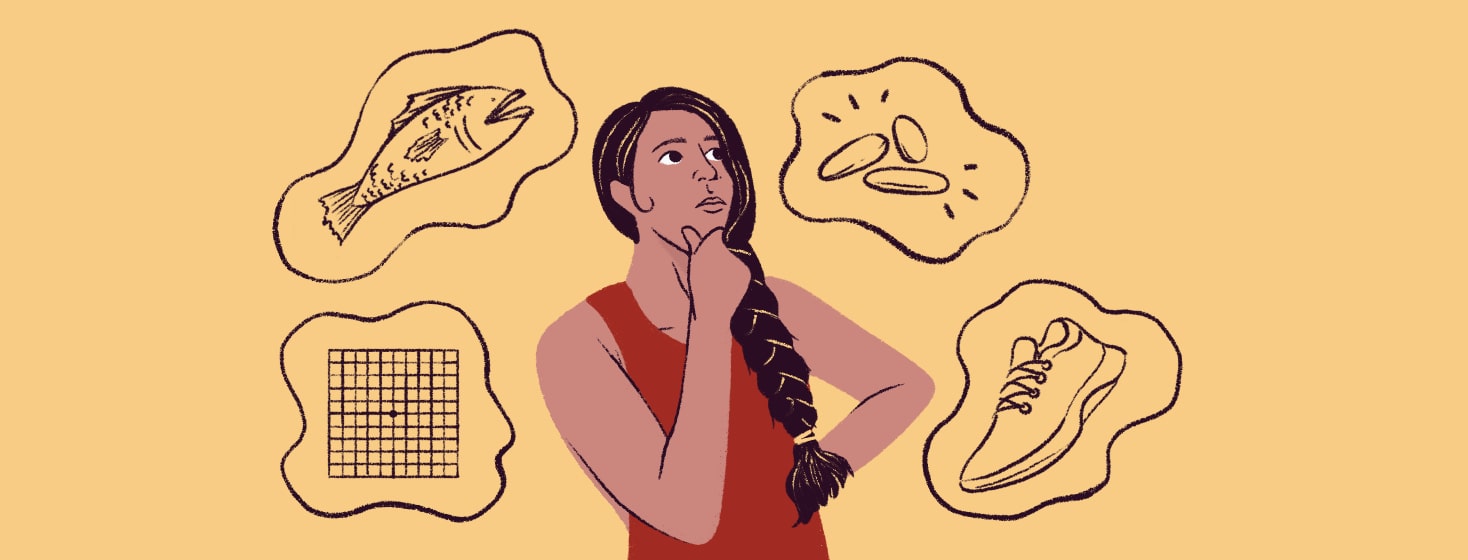What Can I Do Now to Help Prevent Worsening Vision?
Gasp! We’ve all been there. That moment where you first learn that you have this thing called macular degeneration. You may be thinking, ‘I was just told I have macular degeneration (aka: AMD, ARMD, MD, myopic macular degeneration, age-related macular degeneration… Am I missing any?)! What do I do now? How do I prevent my vision from worsening?
What can we do about it?
For some reason, a lot of emphasis is placed on what can’t be done with a Mac D diagnosis: There is no cure, lost vision is permanent, you could totally lose your central vision... Well, I think that’s a bunch of rubbish and I choose to focus on the things I CAN do. It’s important to note that there is no magical cure for macular degeneration. The things I list in this article are ways to help keep our eyes as healthy as possible.
Learn all you can!
Hey! Look, you’re already accomplishing your first goal: learning all you can about the ins and outs of this disease. You may not have even known you were doing this, but if you’re here reading this article, you’re well on your way! Being a part of this outstanding community is also another giant step in the right direction.
See your doctors regularly
Another simple thing you can do is become established with the right doctors so if you ever need them, they’ll be there to help you. It’s so very important to know that acting quickly with vision loss or changes in vision is to the preservation of our vision. Waiting to see a doctor (or waiting to get in to see a new doctor)…even just for a short period of time, can have detrimental and lasting effects on our vision.
Tip: You’ll want to have either an optometrist or ophthalmologist on hand, as well as a retina specialist that you see yearly at a minimum.
Check your Amsler Grid
This brings me to my next topic - the good ol’ Amsler Grid! The Amsler Grid is literally a small grid that you can quickly look at each day to be sure you’re not having any changes in your vision. I love using my Amsler Grid because it gives me a relieving sense of ‘Phew, all is well with my eyes today!’ Also… See above where I mention that time matters. If I am having any visual changes, I notice them by using my Amsler grid, oftentimes before they are noticeable to my everyday vision, so I can get into the doctor and get the help I need quickly.
Eat the right foods
One easy way to help keep our eyes as healthy as possible is to eat well. Our eyes specifically need lutein and zeaxanthin (see this article on the specifics: https://maculardegeneration.net/living/lutein-zeaxanthin). We get these nutrients in the foods we eat and the vitamins we take. Fruits and veggies are my go-tos for getting these powerhouse nutrients for my eyes as well as trying to follow the Mediterranean Diet whenever I can.
PS… If you’re looking for help in eating the right foods, you’re in the right place! We’ve done the work for you! Be sure to check out the recipe section of our website. We even have grocery lists for you if that’s helpful.
Take your vitamins
Vitamins? Yep. This is one of those things that you’d want to talk to your doctor about prior to starting up, but vitamin supplementation is something we can do to help our eyes. It’s important to remember that the point of vitamins is not to improve our vision, but to keep our eyes as healthy as possible. If you eat really clean, you may not need to supplement as much as someone who doesn’t keep track of their nutrients in their diet.
For example, I know I don’t eat enough fish. And, I know that my eyes need Omega-3 fatty acids in order to function their best. So, I supplement my Omega-3 fatty acids in vitamin form. We each have unique needs when it comes to vitamin supplementation and the way our bodies respond to them. This is why it’s important to chat with your doctor prior to taking them.
Exercise
It’s important for those of us with macular degeneration to exercise for a few reasons. First, keeping a healthy body weight alleviates added pressure on our eyes and retinas. Second, the hormones released during exercise allow the nutrients we ingest (via eating healthy food or vitamin supplementation) to process properly.
P.s., If you’re a smoker, you may want to seriously consider whether or not you want to continue to do that. Smoking is the number one controllable factor in a macular degeneration diagnosis. If you’re a smoker, you’re significantly more at risk for developing this disease.
Check your mental health
Last, but most certainly not least, don’t forget to acknowledge your difficult feelings. I’m not sure it’s possible to be diagnosed with macular degeneration without experiencing hard feelings. It’s more than normal, and more than okay, to struggle emotionally. Exercise can help with this, but I personally wasn’t able to make it through without seeking professional help.
It really helps me to focus my energy on all the things I can do versus the things I can’t when battling this disease. If you’re looking for more detailed information on any one of these topics, you can do so by using the search tool at the top of our website www.maculardegeneration.org.
Andrea Junge

Join the conversation